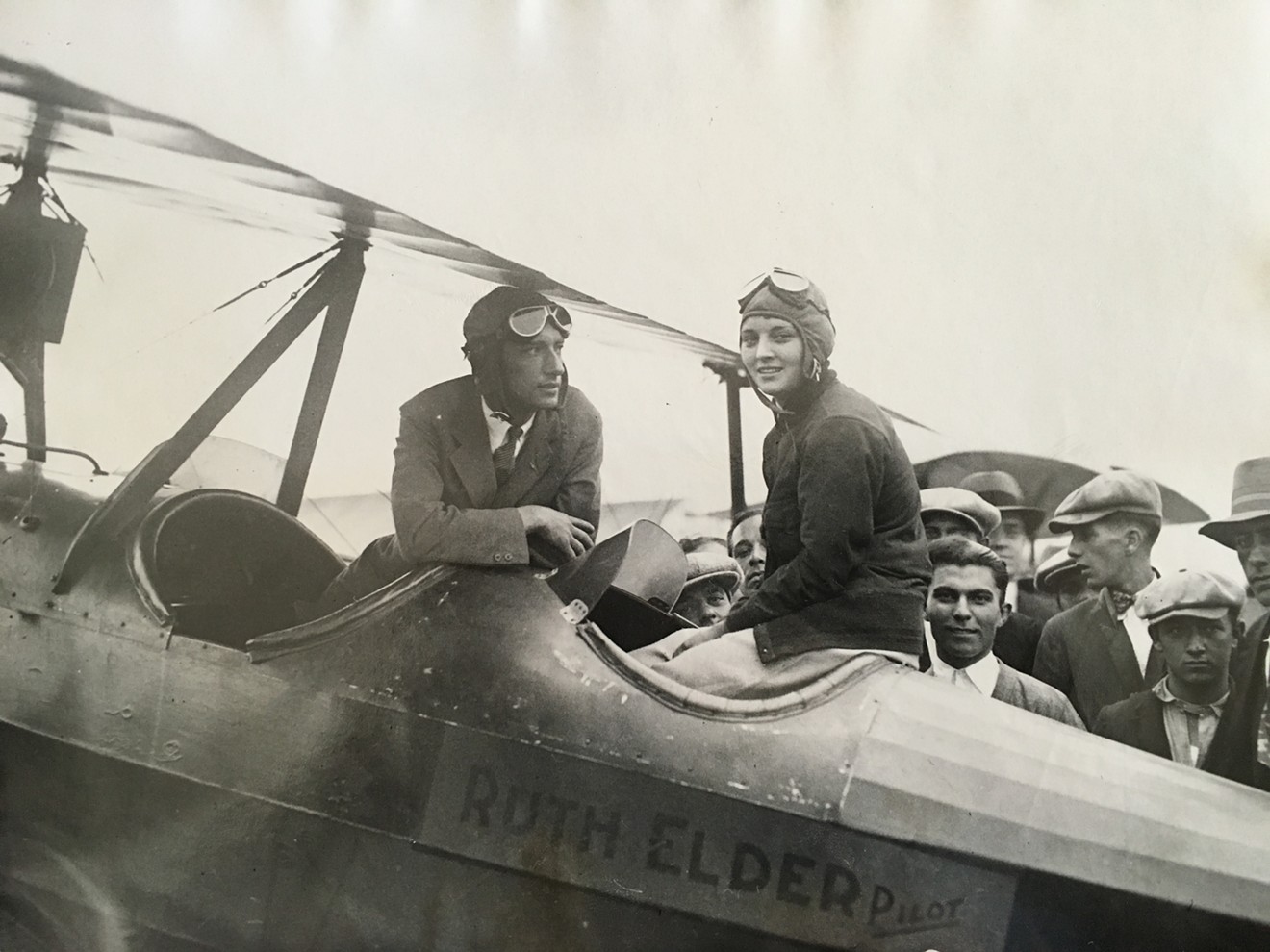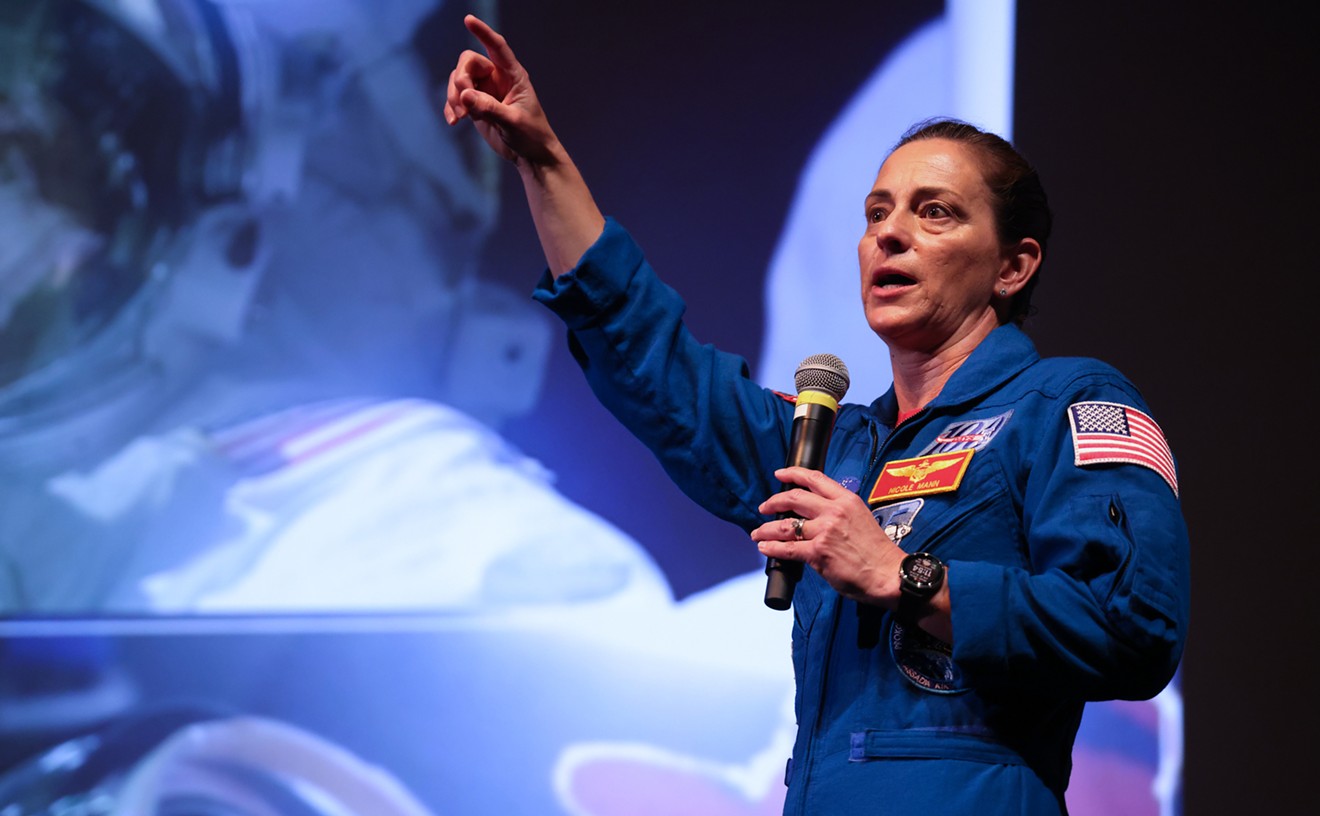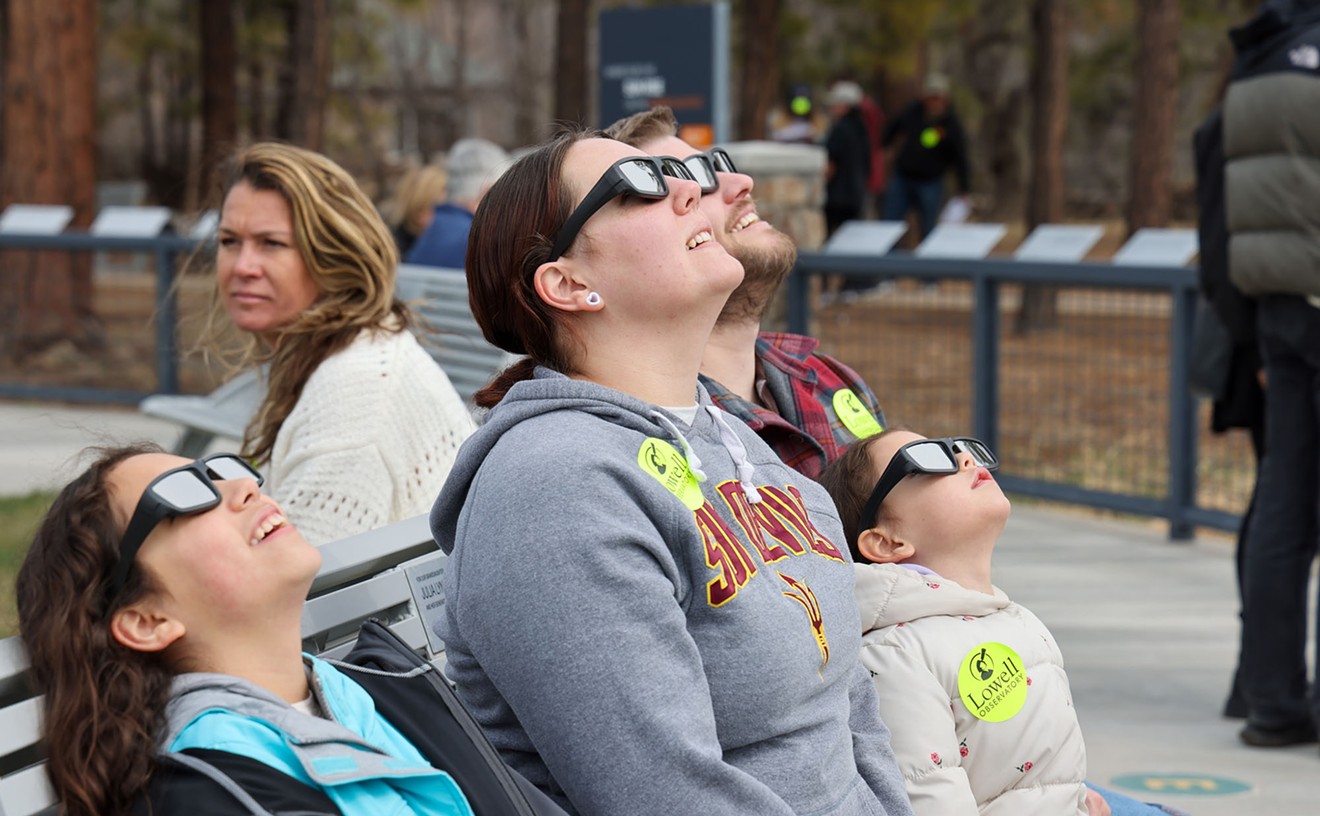One of the Most Fascinating, Forgotten Stories in Aviation History
An excerpt from Laurie Notaro's Crossing the Horizon.
June 21, 2017

Ruth Elder and George Haldeman in the American Girl.
Courtesy of Laurie Notaro
[
{
"name": "Air - MediumRectangle - Inline Content - Mobile Display Size",
"component": "18478561",
"insertPoint": "2",
"requiredCountToDisplay": "2"
},{
"name": "Editor Picks",
"component": "16759093",
"insertPoint": "4",
"requiredCountToDisplay": "1"
},{
"name": "Inline Links",
"component": "17980324",
"insertPoint": "8th",
"startingPoint": 8,
"requiredCountToDisplay": "7",
"maxInsertions": 25
},{
"name": "Air - MediumRectangle - Combo - Inline Content",
"component": "16759092",
"insertPoint": "8th",
"startingPoint": 8,
"requiredCountToDisplay": "7",
"maxInsertions": 25
},{
"name": "Inline Links",
"component": "17980324",
"insertPoint": "8th",
"startingPoint": 12,
"requiredCountToDisplay": "11",
"maxInsertions": 24
},{
"name": "Air - Leaderboard Tower - Combo - Inline Content",
"component": "16759094",
"insertPoint": "8th",
"startingPoint": 12,
"requiredCountToDisplay": "11",
"maxInsertions": 24
}
]
When Charles Lindbergh landed at Le Bourget — the aerodrome in Paris — on May 21, 1927, he instantly became a worldwide hero and inadvertently set off a chain of events that would entice six women to take to the skies to prove that they could do anything a man could.
The aviatrixes were varied in background: an earl’s daughter; a German princess; a wealthy young widow; the niece of Woodrow Wilson; a gorgeous beauty pageant winner from a poor Alabama family; and a social worker. But they all had one thing is common — the compelling desire to not only cement her name in history but to be the first woman to cross the Atlantic Ocean by air.
Half of the six were actually pilots, and half perished during their attempts. While it is common knowledge that Amelia Earhart, the social worker, was the one to finally claim the prize, few people know about the remaining five. Even fewer realize that Earhart did not actually pilot her way across the Atlantic in 1928, but made the crossing as only a passenger, asleep and nauseated when she was overcome by fumes, and woke up to fame after landing in Wales.
Two other women were at the controls during their own flights: Elsie Mackay, the earl’s daughter, and Ruth Elder, the beauty pageant winner from Anniston, Alabama. The aviatrixes, along with Mabel Boll, the wealthy young widow, are the main subjects of Crossing the Horizon, a novel heavily based on fact. The book tells the story of the women’s race across a violent ocean, those who were lost during their flights, those who came close, and one who just might have beat Earhart to the punch. Crossing the Horizon was published in October 2016 by Simon and Schuster, and will be released in paperback on June 28, available everywhere.
The newspapers sold out when they hit the streets.
“Everybody in France is eager to see this audacious girl succeed in proving that she is not a weak woman. If she does succeed, that lovely American will have a triumph as great as Lindbergh’s. The daring and self-confidence of the American Girl has imbued the public opinion with the conviction that she will succeed. There will be no pessimistic predictions that sought to discourage flights since the recent scenes of transatlantic disasters.” — The New York Times, October 12, 1927
The crowd around the American Girl, now sitting on the edge of the runway, was expanding by the moment. Hundreds, maybe a thousand people surged into the field, eager to get a look at the crazy girl who was going to attempt the impossible. Police had been called in to keep the crowd manageable. Ruth Elder looked out from the hangar and laughed at it all before heading out to the plane, a wicker hamper on her arm that contained sandwiches, broth, coffee, and apples.
Wearing the knickers her mother had made her, a dark sweater, a man’s shirt, a smart little black tie, and a scarf around her head, she stood up on the wing, placed the hamper in the plane and waved to the crowd; a roar answered her back. Under her arm was her stuffed Felix the Cat, brought along for luck and security, and the tiny bible. She plumped her curls with her hands, pulled out a compact, powdered her nose, and blew a kiss to the crowd before yelling out, “I’m off to Paris to buy an evening gown!” which was met with whoops and hollers before she climbed into the cockpit with a smile that almost matched the size of the wingspan. George Haldeman, her co-pilot, climbed in beside her and she started the engine.
The crowd moved back slightly but was reluctant to lose their last glimpse of Ruth Elder and the American Girl taking off. Slowly, the Roosevelt Field crew and policemen moved the crowd back carefully until there was enough clearance that George gave a thumbs up. The crowd went mad.
The plane lurched forward quickly once and then rolled forward with caution and ease. The plane continued down the field, picking up speed, faster, quicker, bumpier.
From the crowd, all eyes were on the little maroon and orange plane that raced down the runway, its motor whirring, almost unheard over the cheering of the people there to see it off. Then, suddenly, it was in the air, just above the runway at first, then, climbing higher and higher as it passed over the horizon, the sun barely behind it, and flew on eastward to challenge an ocean.
The American Girl had flown for six hours before it hit the first storm, right after the steamship American Banker had sighted the plane. With George now piloting, they approached it apprehensively; from the new moonlight that had just begin to show, they could see the tall stack of clouds waiting for them on the horizon, with nothing visible beyond it. It looked like the mouth of a monster, Ruth thought, ready to eat them in one, easy bite.
“You’ve flown through storms before,” George reminded her. “We knew this was coming. Lindbergh flew through these same storms. He got through just fine.”
It began to rain far ahead of the dark tower in front of them, and the wind began to pick up, jostling the American Girl a little from the north.
Soon, the jostling turned to bucking, and the rain that had pattered on the windshield was now slamming itself against it. George was solely relying on the instruments to tell him how high and where they were, trying to keep them at a constant 1,000 feet. Visibility was impossible; the blur of the constant downpour made it useless to try and see anything. As the seconds passed, the more the wind began to shriek around the plane that Ruth once thought so sturdy and big and safe. It now felt like she was flying in a rattling Uneeda biscuit tin with the top in danger of blowing off.
The plane dropped into an air pocket quick enough to make Ruth lose her breath. George got it back up as the plane tipped from side to side, battling both the wind and the rain that was desperate to hold it back. After several hours, George asked Ruth to take the controls; the plane needed refueling. He scrambled into the back to fuel the plane from inside.
Ruth, now in control of the plane, struggled hard to keep the plane up; with its heavy load and the gale fighting against it, it took every ounce of strength she had to keep the yoke up and the plane out of the ocean below. Her arms were burning, her chest aching as the plane beat on, pitched at the whim of the wind.
It was clear to George that ice was forming on the wings, which would be the most alarming and critical obstacle they could face. Ice, alone — even without the winds that they were facing — could grow heavy enough to draw a plane into the waves with little effort, and nothing could be done to fight it.
After filling the tanks, he took the controls back from Ruth and realized how much rougher it was becoming even still. The storm was massive, with the American Girl fighting through it all night. Neither Ruth nor George needed the caffeine pills they had brought aboard, the adrenaline surging through their bodies in the struggle to keep the plane airborne was enough to keep them alert and awake.
Blast after blast hit them. The rain was coming from all directions, and had, as George feared, turned to sleet. He felt the plane getting heavier, and it became more of a fight to keep her up at a decent level. He was losing altitude, slowly.
The American Girl was sinking in the air.
“Ruth,” he said calmly, after dropping 100 feet in a matter of seconds, “I want you to put your life suit on.”
He didn’t need to tell Ruth why; she could see the instruments and had felt the drop.
“Dump the fuel, George,” Ruth said quickly. “We have to dump the fuel. In ten minutes, if that, we’re going to be in those waves. We have to lighten the plane. It’s the only thing we’ve got.”
“I know,” George said, a bead of perspiration finally appearing both over his lip and on his brow. “I can’t keep her up, Ruth. The ice is dragging us down. Can you do it?”
Ruth nodded and scrambled into the back. She grabbed for the tin, each at least twenty pounds, and brought them up, one by one, dumping them out the window. On the fourth tin, she dared herself to look down and see how far they were from the water, and gasped when she saw it was only a matter of twenty or so feet.
“Oh my God,” she whispered to herself, not wanting to let George know that she was terrified enough to turn to ice herself. She dared herself to glance at the wings; they were encased in long, thick tombs of ice, horizontal icicles forming off the edges like deathly streamers reaching back at least a foot.
In several minutes, she knew, they would be in the water.
Ruth returned to the window repeatedly, her shaking arms pouring out gallons of invaluable fuel into the ocean below. With no results after twenty gallons had been released, she simply picked up the cans and threw them out the window with as much strength as she could gather, several of them hitting the side of the plane with a substantial blow as they dropped. Twenty more gallons went out the window, and George wasn’t gaining anything.
“Throw more,” George yelled as the wind whipped through the cabin and the rain stung when it landed. “Don’t stop until I tell you to!”
Ruth tossed five, ten, twenty more. Thirty. She had offered up seventy gallons of fuel to the Atlantic in exchange for a little bit of a chance to survive that moment, and only that moment. Slowly, with each can after that tossed into the raging ocean, the plane began to lift by increments too small to measure, first just by inches and finally enough until Ruth could no longer feel the spray from the waves on her face, just the pounding rain.
George flew the plane as high as he could, which was barely 100 feet off the crests of the Atlantic. After a half an hour, it seemed as if they had made it through the most savage part of the storm, and the rain was no longer freezing. In an hour, a good portion of the ice had melted as the warmer rain beat away at it, and the winds began to ease. George was able to pick up speed and altitude, and after grueling hours fighting the storm, he turned the controls over to Ruth, relieved but weary.
Ruth flew on for a little while longer as the storm let up, realizing that she had been foolish to disregard the weather; she had no idea what weather actually meant until just a few hours ago. She had never been so petrified and awed in all of her life. What was in the Atlantic, she understood, wasn’t anywhere else in the world. This was a sacred place of catastrophe and fear, and she had raced ahead like a little child, damning the nature of it and daring it to challenge her. Her apathy shamed her.
After eight hours of unrelenting battle, the American Girl was suddenly thrust out of the wind and rain and into the last minutes of moonlight of the night. The plane returned to a steady, smooth ride and Ruth finally exhaled the sigh of relief she had been holding in for the entire night. It was serene; it was quiet. The Atlantic, in that moment, was dormant.
After a couple of minutes of tranquility, she handed George a turkey sandwich and the flask of broth, and suggested he eat it. He didn’t argue, seeing what she saw farther up, but still very present and directly in their path; a black, blue and purple churning storm that covered the entire horizon, and flashing from inside with charges of light.
George did not like the look of the clouds ahead, standing tall and broad and looking impenetrable. He did not know if the plane had it in her to face another storm; the one behind them had almost brought the plane down, and it took a while before he, himself, felt that they were no longer facing an unavoidable death. It was true; he had taken the plane up into all kinds of weather; when he saw a storm approaching while at Roosevelt Field, he hopped into the plane and took her up in it. Those storms, however, belonged in a nursery compared to what they had just faced. The rage of it was what surprised him the most; the pitiless, dogged pummeling seemed nearly allegorical to him, almost as if the storm was fabricated to simply and pointedly destroy them and only them.
And here was another one directly on its heels.
“I’m going to try to go over it,” he said to Ruth, who nodded in agreement. She seemed a little shell shocked, too. “It looks thinner at the top, don’t you think?”
Ruth leaned forward in her seat, closer to the windshield. No rain so far. The clouds were thinner, wispy at the top, while the storm seemed thicker at the bottom, like a pyramid.
“We’ll just climb, Ruth. We’ll just climb,” he said, pulling the plane up, as high as it would go. He passed eight thousand, nine thousand, ten thousand, eleven thousand. He was still facing a column of blackness with bursts of lightning, and he was heading straight into the middle of it.
“Ruth,” he said as calmly as he possibly could. “You’re going to need to hold on. There’s just a whole bunch of madness in there and we’re headed for the thick of it.”
She nodded, and as the clouds got closer and blacker and darker, she held her breath as if they were heading for a huge stone wall, waiting for the impact.
Although the sun had begun to rise, as they passed into the column, it immediately swallowed them and shuttered out all light. The darkness was piercing, suffocating, so much that Ruth could not see out the window but could not make out anything in front of her inside the plane. It was as if they had been eclipsed, swallowed into a murkiness that didn’t even allow shadows. The American Girl bucked as a gust of wind hit them straight on, almost the collision that Ruth had braced for. She held on as Haldeman still made an attempt to climb up and out, but with the oppressive wind, it was useless. A bright flash illuminated the cabin for a second with a crashing clap of thunder, and she saw Haldeman, gripping the yoke, his lips tight, his focus directly ahead.
It’s as black as the water up here, Ruth thought. There’s nothing here but black. We could be in the water and not even know until it leaked in.
As if to prove her wrong, another flash cracked the sky like an eggshell directly in front of them, jagged and sharp, blindingly bright. Ruth flinched and swore she saw the clouds behind it come to a rolling boil.
The plane shook in the wind, heavy from the east, not so much blowing them but pushing them with a force that was futile to fight. Haldeman abandoned his attempt to climb and just tried to keep the plane steady, gripping the yoke until his knuckles hurt. He could not fly another eight hours like this if this storm was as large as the last. He would be amazed if the plane didn’t begin bursting apart from the pressure.
Ruth saw all of this on his face each time the light exploded in front of them, to the side of them, from behind.
“I’m sorry, George,” she called out. “I’m so sorry.”
A stab of lightning gave them light for a split second, combined with a loud slap of thunder.
“No,” Haldeman yelled back. “Don’t say that. Don’t say it.”
At the same moment, they both saw the black fade into grey, then violet, then lavender. White streaks flickered about the cabin; the sun was out, just behind the last layer of clouds. The brightness lay right before them, it would be only moments before they could see it. Finally, the curtain dissolved, and there they were, in the light, in the sun, with a horizon they could see ahead and the sea they could see below.
“Woooooo!” Ruth yelled as she shot the plane over the waves at 100 miles per hour. “George, George, George, this is glorious! Isn’t this glorious?”
“It sure beats rain, lightning and the feeling you’re about to die,” he said, laughing.
“How far do you think we were blown off course?” Ruth said, still basking in the fact that there was only sun in front of her and no black, man-eating clouds. “I’m guessing at least a couple hundred miles.”
“I think more than that,” he said, not looking very happy anymore. “We’ve been up for 25 hours. I’d say we are still five to six hundred miles from land.”
“The oil pressure looks odd,” Ruth commented. “And the fuel is … the fuel is strange, too.”
“Hmmm,” he said, giving it a look. “Looks like it’s time to refuel.”
He worked his way to the back, now with much more room since most of the fuel had been either dumped overboard or used.
He took a wrench and opened the fuel can, then fed it into the inside tank.
“How about now?” he called.
Ruth shook her head.
“No change,” she yelled back. “None at all.”
“And the oil pressure?” he asked.
“It’s dropped a bit,” she said. “Why would it drop like that?”
George came back to his seat, leaned down, and then was silent.
“What is it? Ruth asked.
He held up a finger dripping with blackness.
“Shit,” Ruth barely said, her eyes just staring.
“After all of that,” George says. “The storm, the lightning, the wind, and this is what it comes down to? A broken oil pipe?”
“How much farther can we go?” Ruth asked, feeling a coldness creep up her spine.
“Not far enough,” George said, laughing in half-panic, half-anger. “We are nowhere.”
He just sat, not knowing what to do. With no oil pressure, no fuel was getting to the engine. He knew the protocol — climb as high as you can and make a slow glide down for a landing. Unless you were in the middle of the Atlantic Ocean on what was now a beautiful, sunny day.
“Climb?” Ruth asked, and he nodded.
“As high as we can, then we’ll hope that we’ll catch a good tailwind. Use as little fuel as we can,” he said.
They were able to fly on for several more hours, albeit slowly, but the pressure continued to drop, the oil was now all over the cabin floor and they were both busily scanning the horizon for any strip of brown or green or solid-looking thing.
There was nothing.
They flew in silence.
There was nothing below them but black waves tipped in white.
It looked so cold.
The knocking from the engine began slowly and not so loud, but after another hour of flying, the pounding was almost paralyzing, sounding more like a clock that was counting down their last seconds than an engine struggling to keep a plane in the air.
The both of them tried to ignore it, but as the noise got louder and louder with each passing minute, it became impossible.
“Is it time now to say I’m sorry, George?” Ruth asked again.
“No,” he said. “But you need to put your life suit on.”

KEEP NEW TIMES FREE...
Since we started New Times, it has been defined as the free, independent voice of Phoenix, and we'd like to keep it that way. Your membership allows us to continue offering readers access to our incisive coverage of local news, food, and culture with no paywalls.
You can support us by joining as a member for as little as $1.

Laurie Notaro


Newsletter Sign Up
Enter your name, zip code, and email
I agree to the Terms of Service and
Privacy Policy
Sign up for our newsletters
Get the latest music, news, free stuff and more!
Trending
Use of this website constitutes acceptance of our
terms of use,
our cookies policy, and our
privacy policy
The Phoenix New Times may earn a portion of sales from products & services purchased through links on our site from our affiliate partners.
©2024
Phoenix New Times, LLC. All rights reserved.
Do Not Sell or Share My Information
Do Not Sell or Share My Information









